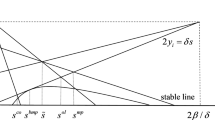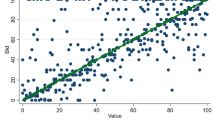Abstract
Previous studies have shown that simply knowing one player moves first can affect behavior in games, even when the first-mover's moves are known to be unobservable. This observation violates the game-theoretic principle that timing of unobserved moves is irrelevant, but is consistent with virtual observability, a theory of how timing can matter without the ability to observe actions. However, this previous research only shows that timing matters in games where knowledge that one player moved first can help select that player's preferred equilibrium, presenting an alternative explanation to virtual observability. We extend this work by varying timing of unobservable moves in ultimatum bargaining games and “weak link” coordination games. In the latter, the equilibrium selection explanation does not predict any change in behavior due to timing differences. We find that timing without observability affects behavior in both games, but not substantially.
Similar content being viewed by others
References
Abele, S., Bless, H., and Ehrhart, K.-M. (in press). “Social Information Processing in Strategic Decision Making: Why Timing Matters.” Organizational Behavior and Human Decision Processes.
Amershi, A., Sadanand, A., and Sadanand, V. (1989). “Manipulated Nash Equilibria I: Forward Induction and Thought Process Dynamics in Extensive Form.” Discussion Paper 1989-4, University of Minnesota.
Bagai, J.S. (1992). Influencing Behavior in Ultimatum Bargaining. University of Pennsylvania.
Bagwell, K. (1995). “Commitment and Observability in Games.” Games and Economic Behavior. 8, 271–280.
Blount, S. (1995). “When Social Outcomes Aren't Fair: The Effect of Causal Attributions on Preferences.” Organizational Behavior and Human Decision Processes. 62(2), 131–144.
Blount, S. and Bazerman, M. (1996). “The Inconsistent Evaluation of Absolute Versus Comparative Payoffs in Labor Supply and Bargaining.” Journal of Economic Behavior and Organization. 30, 227–240.
Boles, T.M. and Messick, D.M. “Accepting Unfairness: Temporal Influence on Choice.” In K. Borcherding, O.I. Laricher, and D.M. Messick (eds.), Contemporary Issues in Decision Making. Amsterdam: North-Holland, pp. 375–389.
Bryant, J. (1983). “A Simple Rational Expectations Keynes-Type Model.” Quarterly Journal of Economics. 97, 525–529.
Budescu, D.V., Au, W.T., and Chen, X.-P. (1997). “Effects of Protocol of Play and Social Orientation on Behavior in Sequential Resource Dilemmas.” Organizational Behavior & Human Decision Processes. 69(3), 179–193.
Camerer, C.F. and Karjalainen, R. (1994). “Ambiguity-Aversion and Non-Additive Beliefs in Non-Cooperative Games: Experimental Evidence.” In B. Munier and M. Machina (eds.), Models and Experiments on Risk and Rationality. Dordrecht: Kluwer Academic Publishers, pp. 325–358.
Camerer, C.F. and Knez, M. (1997). “Coordination in Organizations: A Game-Theoretic Perspective.” In Zur Shapira (ed.), Organizational Decision Making. Cambridge: Cambridge Series on Judgment and Decision Making.
Camerer, C.F. and Thaler, R. (1995). “Anomalies: Dictators, Ultimatums, and Manners.” Journal of Economic Perspectives. 9(Spring), 209–219.
Cooper, R., DeJong, D., Forsythe, R., and Ross, T. (1993). “Forward Induction in the Battle-of-the-Sexes Games.” The American Economic Review. 83, 1303–1316
Güth, W., Huck, S., and Rapoport, A. (1998). “The Limits of the Positional Order Effect: Can it Support Silent Threats and Non-Equilibrium Behavior.” Journal of Economic Behavior and Organization. 34(2), 313–325.
Ho, T.-H., Camerer, C., and Weigelt, K. (1998). “Iterated Dominance and Iterated Best-Response in Experimental ‘p-Beauty Contests.’” American Economic Review. 88, 947–969.
Huck, S. and Muller, W. (2000). “Perfect Versus Imperfect Observability—An Experimental Test of Bagwell's Result.” Games and Economic Behavior. 31, 174–190.
Kreps, D.M. (1990). Game Theory and Economic Modelling. Oxford: Oxford University Press.
Miller, D.T. and Gunasegram, S. (1990). “Temporal Order and the Mutability of Events: Implications for Blame Assignment.” Journal of Personality and Social Psychology. 59, 1111–1119.
Mitchell, D., Russo, J., and Pennington, N. (1989). “Back to the Future: Temporal Perspective in the Explanation of Events.” Journal of Behavioral Decision Making. 2, 1–23.
Morris, M.W., Sim, D., and Girotto,V. (1998). “Distinguishing Sources of Cooperation in the One-Round Prisoner's Dilemma: Evidence for Cooperative Decisions Based on Illusions of Control.” Journal of Experimental Social Psychology. 34, 494–512.
Muller, R.A. and Sadanand, A. (1998). “Virtual Observability in Two Person Games.” Unpublished manuscript.
Rabin, M. (1993). “Incorporating Fairness into Game Theory and Economics.” American Economic Review. 83, 1281–1302.
Rapoport, A. (1997). “Order of Play in Strategically Equivalent Games in Extensive Form.” International Journal of Game Theory. 26(1), 113–136.
Rapoport, A., Budescu, D., and Suleiman, R. (1993). “Sequential Requests from Randomly Distributed Shared Resources.” Journal of Mathematical Psychology. 37, 241–265.
Ross, L. and Samuels, S. (1993). The Predictive Power of Personal Reputation versus Labels and Construal in the Prisoner's Dilemma Game. Stanford, California: Stanford University.
Schelling, T. (1960). The Strategy of Conflict. Cambridge, MA: Harvard University Press.
Van Huyck, J.B., Battalio, R.B., and Beil, R.O. (1990). “Tacit Coordination Games, Strategic Uncertainty, and Coordination Failure.” American Economic Review. 80(1), 234–248.
Von Neumann and Morgenstern. (1947). The Theory of Games and Economic Behavior. 2nd ed. Princeton: Princeton University Press.
Weber, R.A. (2001). “Learning and Behavior in the ‘Dirty Faces' Game.”’ Experimental Economics. 4(3), 229–242.
Author information
Authors and Affiliations
Corresponding author
Rights and permissions
About this article
Cite this article
Weber, R.A., Camerer, C.F. & Knez, M. Timing and Virtual Observability in Ultimatum Bargaining and “Weak Link” Coordination Games. Experimental Economics 7, 25–48 (2004). https://doi.org/10.1023/A:1026257921046
Issue Date:
DOI: https://doi.org/10.1023/A:1026257921046




